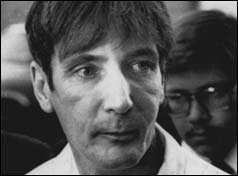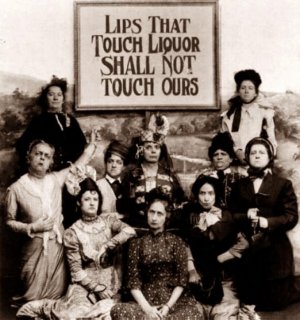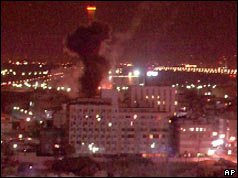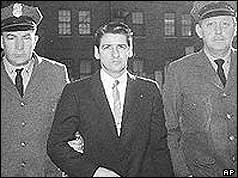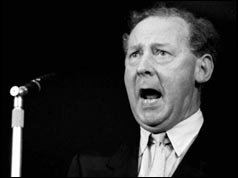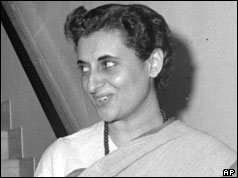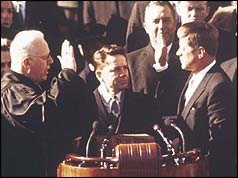On this day in History
17/01/1991
'Mother of all Battles' begins
The Gulf War Allies have sent hundreds of planes on bombing raids into Iraq, at the start of Operation Desert Storm.
The American, British, French, Saudi and Kuwaiti aircraft took off at 2330 GMT last night.
Their bombs were aimed at military and strategic targets, including an oil refinery and Baghdad airport.
At least 400 raids took place. Latest reports say all the Allied aircraft have returned home safely, although France says four of its planes were hit.
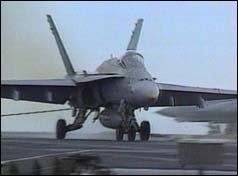 Tornado down 17/01/1991
Tornado down 17/01/1991
Flight Lieutenant John Nichol was shot down on 17 January 1991 on the first low-level daylight raid of Operation Desert Storm.
He was captured, tortured and paraded on television by the Iraqis.
Twelve years later - and with war in Iraq yet again threatening - the former Tornado navigator told On This Day about his experience.
We took the last few drops of fuel from the tanker and then dropped down over the Saudi-Iraq border and we headed straight in towards the target.
It was about a 20-minute run-in at low-level high-speed. In the final stages of the attack we were probably flying in at 600 mph [965 kmh] and were maybe 25 or 30 ft [7.6 - 9.1 m] above the desert.
No aircraft has any real defence against visually-aimed anti-aircraft fire - apart from trying to dodge it or put your head down in the cockpit and try and make yourself as small as possible.
It's not that effective as a weapon, but it's terrifying when you see it.
At the time we didn't know we were being hit because we were concentrating on the task of trying to get the weapons on the target.
After our attack failed we were running back home when suddenly we were hit by a heat-seeking missile - a SAM 7 or a SAM 14.
You certainly know you've been hit by that - it's a supersonic telegraph pole.
It knocked the aircraft sideways and almost out of the sky - we were within a few feet of hitting the ground.
I can still visualise the missile hitting home and the aircraft tumbling around the sky with absolute clarity.
John, my pilot, managed to get back in control and righted the aircraft so we could begin to limp home.
But all the computer systems and fly-by-wire computer technology had been knocked out and the aircraft was on fire.
The first stages of that were absolute chaos and panic. But you've practised for the situation, and the training brought itself to the fore.
We were desperately trying to go through the drills that might get us back into a controlled situation and give us enough systems and power to get back to the Saudi border.
Ejecting from a military combat aircraft is a phenomenal experience
But it wasn't to be - the aircraft was on fire and the flames were marching steadily to where I was sitting in the rear cockpit.
There was no choice but to eject - and ejecting from a military combat aircraft is a phenomenal experience.
Technology does all of the work - you pull the black and yellow handle that's on the seat and the straps tighten to hold you in - your arms are dragged in, your legs are dragged in.
The Perspex cockpit explodes and the rocket motors in the ejection seat fire - it's like sitting on a large rocket-propelled grenade.
Enemy lines
You're shot out of the aircraft at something like 0 - 200 mph in just under a second and at 18 times the force of gravity.
From pulling the handle to the parachute opening is about one and a half seconds - it's over in the snap of a finger.
You've gone from a burning aircraft to silence and floating down in a parachute and finding yourself sitting deep behind enemy lines.
I think we were on the ground for about three hours. We were trying to make our way to one of the search and rescue points where perhaps some Special Forces would be waiting or a helicopter could come in and rescue us.
But this was the first day of the war and it was unlikely that was going to happen immediately.
The Iraqis saw us and fired their AK-47 assault rifles at us.
It was a surreal situation. Five or six hours before I'd been having breakfast on my military base in Bahrain, and here I was being shot at by Iraqi troops in the middle of the desert.
Some of my friends didn't make it through the Gulf War - so I guess I'm very lucky
We were captured pretty quickly and dragged off to Baghdad - there was no point in trying to have a gun battle.
I suppose even 12 years after the event I still wish the attack had gone well and we had got back to base.
But it's because of my blackest cloud that everything I now do has come about. Some of my friends didn't make it through the Gulf War - so I guess I'm very lucky.
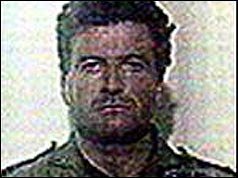 Earthquake devastates Kobe 1995
Earthquake devastates Kobe 1995
Hundreds of people are feared dead and thousands injured after a powerful earthquake struck Japan at dawn.
Worst hit was the port of Kobe, a city of 1.5 million. Whole buildings, apartment blocks and an elevated highway collapsed killing at least 200 people and injuring some 13,000.
Osaka and the ancient city of Kyoto were also severely damaged.
The earthquake measured 7.2 magnitude and was the biggest to hit Japan for 47 years.
It struck at 0546 local time just as commuters were starting their journey into work.
The whole room was moving around like it was made of jelly
The prime minister, Tomiichi Muruyama, has ordered the creation of an emergency committee to handle the effects of the quake and sent troops to help the rescue operation.
1994 - Massive earthquake hits Los Angeles
A huge earthquake has rocked Los Angeles, killing more than 20 people.
The earthquake, which measured 6.6 on the Richter scale and lasted for 40 seconds, struck at 0431 local time (1231 GMT).
More than 1,000 people have been injured and the death toll is expected to rise as rescuers continue to pull bodies from collapsed buildings.
Mayor of Los Angeles Richard Riordan has declared a state of emergency and an evening curfew has been imposed.
The airport has been closed due to a lack of power and doctors are having to perform surgery in the open air because hospital buildings are severely damaged.
'Stay home, stay calm'
The area worst hit is reported to have been the San Fernando Valley where the quake is likely to have affected up to three million people.
Los Angeles emergency services are stretched to the limit and using heat detecting cameras and listening equipment to trace signs of life beneath the rubble.
One of the city's fire fighters, Grove Lumas, said it was fortunate the quake had struck during the night.
He said: "If this had happened in the middle of the day we would have been stacking up the bodies."
Experts are warning of potential aftershocks and police have issued a statement warning of isolated cases of looting.
The authorities have told residents to "stay home" and "stay calm".
1983: BBC wakes up to morning TV
People have been switching on their televisions a little earlier than usual to catch Britain's first breakfast news programme.
The BBC's new Breakfast Time programme went on air at 0630 GMT, presented by Nationwide's Frank Bough and former ITN news reader Selina Scott.
1977: Gilmore executed by firing squad
Gary Gilmore, the convicted murderer, was executed today by firing squad in the Utah state prison in Salt Lake City.
This is the first execution to have been carried out in the United States for almost 10 years.
Gilmore, 36, was sentenced to death for the murder in 1976 of a motel clerk in Provo, Utah.
An appeals court in Denver overturned a restraining order on the execution in the early hours of this morning.
Gilmore's body was taken to the University of Utah Medical Center where his organs will be used for medical research.
